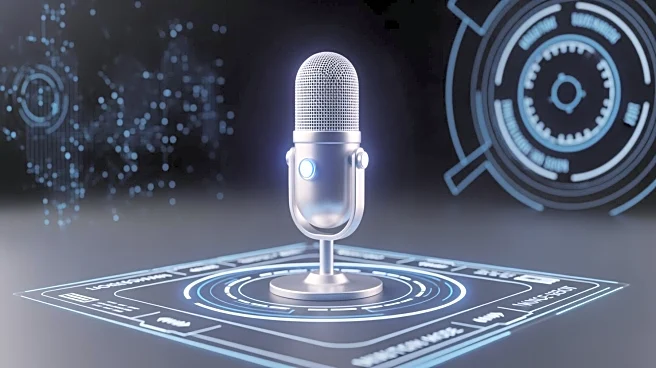What's Happening?
OpenAI has launched a new voice mode feature for its ChatGPT platform, allowing users to engage in hands-free conversations with the AI model. This development enables users to speak directly to ChatGPT and receive spoken responses, creating a more natural
and fluid interaction. The voice mode is available across mobile, desktop, and web applications, and offers two versions: Standard Voice, which is free, and Advanced Voice, available to paid users. The Advanced Voice mode utilizes multimodal models to provide real-time audio responses, adjusting to cues such as speech speed and emotional tone. This feature aims to improve accessibility for users with disabilities and enhance the overall user experience by allowing for more intuitive and efficient communication.
Why It's Important?
The introduction of voice mode in ChatGPT represents a significant advancement in AI technology, particularly in enhancing user accessibility and interaction. By enabling hands-free communication, OpenAI is addressing the needs of users with disabilities, such as those with low vision or dyslexia, who may find voice interaction more convenient than typing. Additionally, this feature can facilitate language learning and real-time translation, offering users a practical tool for everyday use. The ability to engage in natural conversations with AI could lead to increased adoption of AI technologies in various sectors, including education, customer service, and personal assistance, thereby expanding the reach and impact of AI in daily life.
What's Next?
As OpenAI continues to refine and expand its voice mode capabilities, it is likely that other AI developers will follow suit, integrating similar features into their platforms. This could lead to a broader shift towards voice-based AI interactions across industries, potentially transforming how users engage with technology. OpenAI's ongoing improvements to its voice mode, such as enhancing real-time audio processing and expanding language support, will be crucial in maintaining its competitive edge. Additionally, the legal landscape surrounding AI development, as highlighted by the lawsuit from Ziff Davis against OpenAI, may influence future advancements and collaborations in the AI sector.
Beyond the Headlines
The development of voice mode in AI platforms like ChatGPT raises important ethical and privacy considerations. As AI becomes more integrated into daily life, ensuring user data protection and addressing potential biases in AI responses will be critical. Furthermore, the ability of AI to mimic human-like interactions could lead to broader societal implications, such as changes in communication norms and the role of AI in personal and professional settings. These factors underscore the need for ongoing dialogue and regulation to guide the responsible development and deployment of AI technologies.














